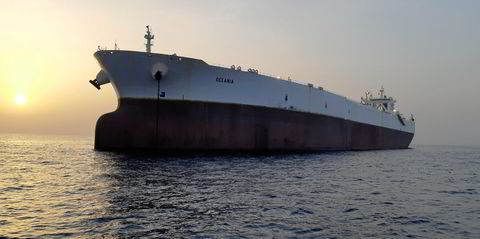Seaspan Corp has been an early market-leading adopter of decarbonisation strategies and more broadly on ESG initiatives.
Our Seaspan Action for Vessel Energy Reduction (SAVER) programme was adopted over 10 years ago and has delivered newbuilds over that time that are among the most fuel-efficient and economical in the industry.
This article is one of more than three dozen contributions from shipping industry stakeholders about their outlook for decarbonisation efforts in the year ahead. We asked shipowners, managers, financial professionals, technology providers and more about their own efforts to address greenhouse gas emissions in 2022 and what they hope to happen in the industry this year.
Early in the process, and continuing today, has been a focus on actions and technologies that would improve the vessel operating efficiencies, including design, propulsion, load-ability, etc.
Our focus resulted in much greater vessel operating efficiency and lower carbon emissions. Going forward, we foresee a greater focus on fuels, and the path ahead to carbon-free shipping.
Our decarbonisation strategy is built around four pillars: (i) continuous efficiency improvement, (ii) transition pathways, (iii) fleet insights and (iv) market-based measures.
In 2022, our corporate goals have been set to align with each of these four pillars.
For continuous efficiency improvement, a full evaluation of our fleet including drydocks, and approved upgrade measures such as optimized bows and propellers, engine upgrades and premium coatings.
For transition pathways, an LNG transition plan will be implemented on 25 of our LNG dual-fuel vessels through 2023 and 2024. Asset transition plans that provide various alternative fuel options and vessel modifications that suit best for different ship sizes, ages, trades and charters of our fleet are also underway throughout 2022.
For fleet insights, advanced data management systems will provide easy access to fleet emission data with automated and verified reporting. This will support comprehensive reporting to our customers, and effective benchmarks and tracking on Poseidon Principles and our ESG initiatives.
For market-based measures, we will continue active dialogues with our charterers around sustainability linked charters and new business models around carbon credits.
We will also commission an updated total cost of ownership (TCO) study, which helps us to identify readiness, scaling, distribution, and cost of alternative fuels. TCO study will be conducted each year to obtain a spontaneous view of the alternative fuel landscape as the market develops.
Being the industry-leading shipowner and operator, we will continue to take lead on the decarbonisation and ESG initiatives to meet the goals of IMO 2050.
To accomplish the goals under IMO 2050, there are two key drivers: (i) technology adoption for vessel design and efficiency; and (ii) commercial availability of selected fuel alternatives.
Full commitment, strict compliance and good cooperation among industry participants are required.
For Seaspan, we have always been a proponent and have taken progressive steps toward sustainability initiatives.







